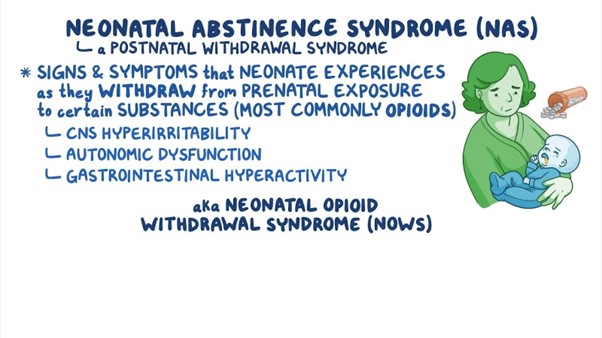A nurse is assessing a neonate who was exposed to heroin in utero. Which of me following findings should the nurse identify as an indication that the neonate is experiencing neonatal abstinence syndrome?
Hyporeflexia
Frequent yawning
Respiratory depression
Constipation
The Correct Answer is A
Neonatal abstinence syndrome (NAS) is a group of withdrawal symptoms that occur in newborns who were exposed to drugs, including heroin, in utero. Hyporeflexia, which refers to reduced or diminished reflexes, is one of the key findings in neonates experiencing NAS.
During pregnancy, when the mother uses opioids like heroin, the baby becomes dependent on the drug. After birth, when the drug is no longer available, the baby experiences withdrawal symptoms as the body adjusts to the absence of the drug. Hyporeflexia is a common manifestation of NAS and is observed due to the central nervous system's response to the withdrawal.
Let's go through the other options:
B. Frequent yawning: While yawning can be seen in neonates with NAS, it is not as specific to the condition as hyporeflexia. Yawning can occur for various reasons and may not always be indicative of NAS.
C. Respiratory depression: Respiratory depression can be a severe complication of opioid exposure in utero and can result in life-threatening situations for the neonate. However, it is not specific to NAS. Respiratory depression is more closely associated with opioid overdose in the newborn, which can be a separate concern from NAS.
D. Constipation: Constipation is a possible symptom in neonates experiencing NAS, but it is not as specific as hyporeflexia. Constipation can occur due to various factors and is not unique to NAS.

Nursing Test Bank
Naxlex Comprehensive Predictor Exams
Related Questions
Correct Answer is ["A","C","D","E"]
Explanation
The nurse should plan to take the following actions:
A.Verify the prescription: Before administering any medication, the nurse must verify the prescription to ensure accuracy, appropriateness, and that it matches the provider's order.
Regarding option B, administering the medication at 1000, 1400, 1800, and 2200 may not be appropriate. The prescription states that ampicillin should be administered every 6 hours. The nurse should administer the medication at equally spaced intervals throughout the day. If the medication is prescribed every 6 hours, the appropriate administration times would be 0600, 1200, 1800, and 2400. However, the question does not provide sufficient information to determine the exact administration times, so option B cannot be definitively selected.
C. Assess the client for an allergy to penicillin: Since ampicillin is a penicillin-class antibiotic, it is essential for the nurse to assess the client for any history of allergies to penicillin or other beta-lactam antibiotics. A penicillin allergy could lead to a severe allergic reaction, so it is crucial to identify any potential allergies before administering the medication.
D. Document giving the medications: After administering the ampicillin, the nurse should document the administration in the client's medical record, including the time, dose, route, and any relevant observations or assessments.
E. Obtain a sputum for culture and sensitivity: The client's new prescription for ampicillin may be related to an infection. To ensure appropriate and effective treatment, obtaining a sputum specimen for culture and sensitivity is necessary. This will help identify the specific bacteria causing the respiratory infection and determine which antibiotics will be most effective in treating it.
Correct Answer is ["0.8"]
Explanation
To calculate the amount of morphine to administer, we can use the following formula:
Amount of medication (mL) = Desired dose (mg) / Concentration (mg/mL)
In this case, the desired dose is 8 mg and the concentration is 10 mg/mL.
Amount of medication (mL) = 8 mg / 10 mg/mL
Amount of medication (mL) = 0.8 mL
Therefore, the nurse should administer 0.8 mL of morphine.
Whether you are a student looking to ace your exams or a practicing nurse seeking to enhance your expertise , our nursing education contents will empower you with the confidence and competence to make a difference in the lives of patients and become a respected leader in the healthcare field.
Visit Naxlex, invest in your future and unlock endless possibilities with our unparalleled nursing education contents today
Report Wrong Answer on the Current Question
Do you disagree with the answer? If yes, what is your expected answer? Explain.
Kindly be descriptive with the issue you are facing.
